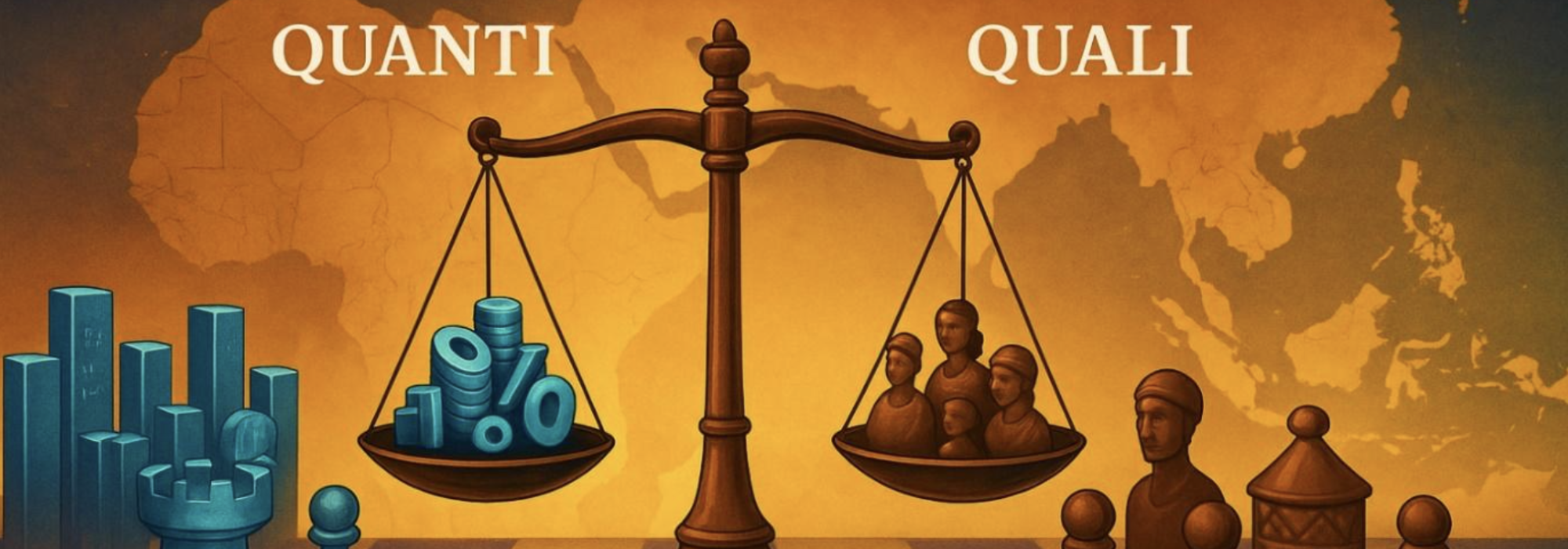The Quantitative vs. Qualitative Ideological Battleground
As climate crises escalate, the urgency of science-informed policymaking grows increasingly pronounced, particularly in the Global South. Here, climate science finds itself at an ideological crossroads, marked by the stark tension between quantitative, metrics-driven methodologies “Precisionism”1 and qualitative, participatory knowledge “Groundtruthing.” This tension is relevant as International organizations like the Intergovernmental Panel for Climate Change (IPCC) extensively rely on quantitative methods to claim objectivity, impartiality, universality and legitimacy in climate assessments. Thomas Kuhn’s [1] concept of “paradigms” is instructive here: scientific paradigms not only guide what is studied but also define what counts as legitimate knowledge, often reinforcing existing power structures by marginalizing indigenous and local knowledges. Epistemologically, the debate echoes the philosophical insights of influential thinkers like Karl Popper [2], Thomas Kuhn [1], Donna Haraway [3], and Bruno Latour [4]. Key questions arise: Whose knowledge shapes policy decisions? Whose realities are recognized? Ultimately, whose futures are prioritized?
Precisionism and the Tyranny of Metrics: The Limits of Quantitative Objectivity
In this article, I present an example of the Precisionist logic in the use of GIS-based flood risk mapping in Cape Town, South Africa. Spatial risk maps, often developed through satellite imagery, hydrological models, and historical flood data, are used to designate high-risk zones and prioritize infrastructural interventions. For instance, flood exposure maps produced for areas like as Khayelitsha, Philippi, Gugulethu, Delft, Masiphumelele, and Imizamo Yethu – Cape Town’s low-income informal settlements – often depict risk zones in deep red overlays, marking them as “vulnerable” or “uninhabitable.” While these visual representations may be intended to protect communities, for example, by informing risk-reduction strategies against hazards like flooding or landslides, their utility is often undermined when used without meaningful local engagement. In some cases, rather than enhancing safety, they inadvertently justify exclusionary planning decisions or displacement under the guise of risk mitigation.
Precisionism frequently falls into what can be termed the “Tyranny of Metrics” – an overreliance on quantification that elevates numbers above meaning, often reducing complex, context-specific realities into decontextualized indicators that obscure structural inequalities and political agency. It lies not only in the tools themselves, but in how their outputs are valorized as final truth, stripped of contextual nuance and ethical interrogation. GIS-based flood risk mapping manifest itself in the reduction of socio-political complexity to spatial data points, and in how these maps obscure the lived realities of residents. Risk, in this context, is often calculated without adequately factoring in historical patterns of spatial injustice, everyday coping strategies, or local knowledge of water pathways. As such, the maps render these communities legible through the lens of informality, law breakers, deficit and danger, rather than resilience and adaptation, thereby reifying socio-spatial stigma. This “metrics mirage” projects an illusion of objectivity while depoliticizing the very conditions that have produced urban vulnerability – colonial land dispossession, Apartheid-era planning legacies, and contemporary governance exclusions.
In short, metrics-driven approaches including GIS risk mapping frequently abstract and depoliticize structural inequalities, systematically marginalizing local experiences and indigenous epistemologies. Sadly, even municipalities and governmental agencies in the Global South increasingly anchor their climate decisions on broad-based surveys and standardized indices without adequate groundtruthing, reproducing epistemic blind spots and disconnecting policy from lived realities.
Groundtruthing: Situated Objectivity through Participatory Approaches
In contrast to the technocratic abstraction of GIS-based flood risk mapping in Cape Town’s informal settlements, Groundtruthing offers an alternative epistemological approach grounded in qualitative, participatory methodologies. Ethnographic and participatory research in Khayelitsha, Delft, Masiphumelele and Philippi, for example, settlements routinely flagged as “high-risk” in municipal flood maps, reveal locally embedded adaptive practices that challenge deficit-based framings [7, 8]. Residents use improvised drainage systems, sandbagging, elevated flooring, and seasonal relocation strategies to manage flood impacts – knowledge that rarely surfaces in spatial models. Community-based organizations and local researchers have employed methods such as transect walks, participatory sketch mapping, and storytelling circles to document these coping strategies and to articulate a politics of place that is often missing in expert assessments [9]. Groundthruthing approaches aligns with Haraway’s [3] notion of situated knowledges, emphasizing that all knowledge is produced from specific standpoints shaped by histories, identities, and power relations. Participatory engagements in Cape Town foreground not only what people know, but also how they experience precarity, exclusion, and resilience within a landscape of structural inequality.
However, Groundtruthing is not without limitations. In some cases, participatory processes risk romanticizing community agency or assuming the existence of unified local voices [10]. For example, in workshops aimed at mapping flood-prone zones, dominant community figures may control discussions, leading to elite capture and the silencing of more vulnerable residents such as women, migrants, or the elderly. Moreover, such participatory outputs are sometimes tokenistically absorbed into planning documents without altering underlying logics or power asymmetries – a process critics have called “participation-washing.”
Thus, while Groundtruthing offers essential epistemic correctives to the “god trick” of technocratic knowledge, it must itself be practiced reflexively, with attention to internal community dynamics, representation, and the risk of external instrumentalization. Without this vigilance, even participatory approaches can unintentionally reproduce the very marginalizations they seek to undo.
Epistemological Diplomacy: Bridging Methodological and Ideological Divides
The tension between Precisionism and Groundtruthing often appears epistemologically and politically irreconcilable. However, positioning them in binary opposition, and dismissing one in favor of the other, is both reductive and counterproductive. Effective and just climate science in the Global South requires what I term epistemological diplomacy: a critical, reflexive, and power-aware commitment to integrating diverse ways of knowing. Epistemological diplomacy is not simply a technical blending of quantitative and qualitative methods; rather, it is an ethico-political stance that deliberately seeks to recognize, negotiate, and redistribute epistemic authority in the co-production of knowledge. It is a process of building methodological bridges while respecting the situatedness, partiality, and politics of all forms of knowledge – whether numeric or narrative, spatial or embodied.
Contrary to conventional assumptions, quantitative approaches are not inherently neutral, and qualitative approaches are not automatically politicized or reflexive. Both are situated and mediated through specific institutional, cultural, and ideological contexts. For instance, the choice of indicators in a vulnerability index reflects value-laden assumptions about what matters; just as a community mapping exercise may obscure internal power hierarchies or silence dissenting voices. Epistemological diplomacy thus urges scholars to interrogate their methods, not only for validity and reliability, but also for whose perspectives they amplify, whose interests they serve, and whose realities they erase. While mixed methods often exemplify the spirit of epistemological diplomacy, this principle can, and should, guide all research types. The key is not the method per se, but the deliberate orientation toward inclusivity, transparency, and epistemic justice.
Successful applications of epistemological diplomacy are emerging through hybrid frameworks such as Ostrom’s co-production model [11,12]. In many Global South contexts, participatory GIS initiatives are integrating satellite data with community-drawn flood maps, enabling residents of informal settlements to visualize risk from both technocratic and lived standpoints [13]. These approaches turn ground-level knowledge into spatial data that challenges official narratives, enabling more equitable decision-making. Yet integration alone is insufficient. True epistemological diplomacy requires actively resisting the co-option of participatory knowledge as “metrics fodder” – stripped of its political charge and reduced to anecdotal legitimacy for pre-formed policies [4, 14].
Instead of forcing convergence between different epistemologies, epistemological diplomacy embraces their differences (productive tension) – fostering ongoing, respectful dialogue that values diverse perspectives without reducing them to a single framework.
Recommendations: Pathways Toward Inclusive Climate Science and Just Futures
Addressing whose objectivity counts is fundamentally ideological, directly influencing equity and justice in climate governance. To foster genuinely inclusive and equitable climate futures, particularly in the Global South, I propose the following recommendations:
- Epistemological Transparency: Scientists and policymakers should explicitly recognize and critically reflect on the ideological underpinnings of their chosen methodologies, increasing accountability and transparency.
- Institutionalized Epistemological Diplomacy: Establish structured platforms fostering continuous dialogue, collaboration, and mutual learning between quantitative and qualitative climate researchers.
- Justice-Oriented Metrics Development: Innovate hybrid metrics incorporating qualitative indicators – such as community resilience narratives, cultural practices, and structural inequalities – to ensure comprehensive, contextually sensitive climate assessments.
- Power-Aware Integration Practices: Protect the political significance of qualitative, participatory insights by ensuring they inform policymaking substantively rather than serving as superficial supplements.
- Democratization of Climate Policy Processes: Develop governance frameworks that genuinely integrate diverse epistemologies, facilitating policies that combine quantitative rigor with qualitative depth, reflecting and addressing diverse community realities and vulnerabilities.
Reflexive Praxis: Positionality in Climate Knowledge Production
As a critical urban scholar researching on urban climate adaptation in African informal settlements, I approach these debates not as an impartial observer, but as a situated knowledge producer shaped by transdisciplinary collaborations, policy engagements, and fieldwork in Cape Town. My reflections are informed by tensions I have experienced firsthand: where GIS-based flood models overlook lived experiences of displacement, and where participatory storytelling among informal settlement residents is dismissed as anecdotal. This blog emerges from grappling with these epistemological fractures – between technocratic authority and community insight, between numeric certainty and experiential depth. I do not suggest that qualitative knowledge is superior or immune to critique. Rather, I argue that all knowledge is partial, contingent, political, situated, and shaped by positionality, and thus requires explicit reflexivity, power-awareness, and ideological transparency. Asking “whose objectivity counts?” is therefore, not a call to replace one orthodoxy with another, but to dismantle the illusion of neutrality and push for methodological pluralism – what I term epistemological diplomacy. Only by recognizing the politics embedded in our tools and truths can we co-produce climate futures that are not just technically sound, but socially transformative.
References
[1] Popper, K. R., & Popper, K. R. (1979). Objective knowledge: An evolutionary approach (Vol. 49). Oxford: Clarendon press.
[2] Kuhn, T. S. (1997). The structure of scientific revolutions (Vol. 962). Chicago: University of Chicago press.
[3] Haraway, D., (2013). Situated knowledges: The science question in feminism and the privilege of partial perspective 1. In Women, science, and technology (pp. 455-472). Routledge.
[4] Latour, B. (2004). Politics of nature. Harvard University Press.
[5] Comte, A. (1858). The positive philosophy of Auguste Comte. Blanchard.
[6] Funtowicz, S. O., & Ravetz, J. R. (1993). Science for the post-normal age. Futures, 25(7), 739-755.
[7] Drivdal, L. (2016). Flooding in Cape Town’s informal settlements: Conditions for community leaders to work towards adaptation. South African Geographical Journal= Suid-Afrikaanse Geografiese Tydskrif, 98(1), 21-36.
[8] Fox, A., Ziervogel, G., & Scheba, S. (2023). Strengthening community-based adaptation for urban transformation: managing flood risk in informal settlements in Cape Town. Local Environment, 28(7), 837-851.
[9] Rodina, L., Harris, L., Ziervogel, G., & Wilson, J. (2024). Resilience counter-currents: Water infrastructures, informality, and inequities in Cape Town, South Africa. World Development, 180, 106619.
[10] Congretel, M., & Pinton, F. (2020). Local knowledge, know‐how and knowledge mobilized in a globalized world: A new approach of indigenous local ecological knowledge. People and Nature, 2(3), 527-543.
[11] Ostrom, E. (1996). Crossing the great divide: Coproduction, synergy, and development. World development, 24(6), 1073-1087.
[12] Vincent, K., Daly, M., Scannell, C., & Leathes, B. (2018). What can climate services learn from theory and practice of co-production?. Climate Services, 12, 48-58.
[13] Membele, G. M., Naidu, M., & Mutanga, O. (2022). Integrating indigenous knowledge and geographical information system in mapping flood vulnerability in informal settlements in a South African context: a critical review. South African Geographical Journal, 104(4), 446-466.
[14] Klenk, N., Fiume, A., Meehan, K., & Gibbes, C. (2017). Local knowledge in climate adaptation research: moving knowledge frameworks from extraction to co‐production. Wiley Interdisciplinary Reviews: Climate Change, 8(5), e475.
- “Precisionism”, grounded in positivist traditions and inspired by Auguste Comte’s [5] vision of applying natural science methods to the study of society, prioritizes numerical models, vulnerability indices, predictive simulations, and standardized metrics. In this article, “objectivity” refers to the presumed neutrality and universality of quantitative knowledge claims, which often conceal the ideological biases and power dynamics embedded in scientific practices. ↩︎
-

Johannes Bhanye
Dr Johannes Bhanye is a Postdoctoral Research Fellow at the African Climate and Development Initiative (ACDI), University of Cape Town. His research focuses on climate resilience, urban governance, and flood adaptation in African cities, particularly in informal settlements. He is passionate about decolonial research approaches that foreground justice, informality, and everyday survival strategies in the Global South.
View all posts

